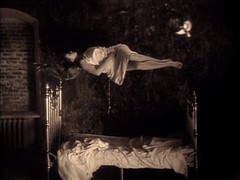Though you may not pick up on it at first, there’s a narrative, albeit sublimely fractured, weaving through this film, one Tarkovsky was miffed others couldn’t easily grasp or felt necessary to overburden with symbolism. “It’s no more then a straightforward, simple story,” he assured one prying interviewer, though I can’t help but think this assertion of the film’s simplicity, and even that the narrative is readily apperent, was anything but feigned.
Because we’re all hopelessly tethered to reason, films that eschew the linear can often try our patience. It can make for a rough viewing when things don’t seem to be making narrative sense. You end up with that prickly feeling, you shift around in your seat and think, “Geez, what am I missing here? Does everybody else get this?” Or, more importantly for the health of your sanity, you can give yourself over to the fact that, especially in this instance, the filmmaker probably didn’t expect you to make sense of the film anymore then they could make sense of it themselves. I almost fell asleep twice watching Mirror, but I loved every second of it. Its animating force, illusive as it is, gains in power until it begins to overwhelm.
Mirror was supposedly the most biographic of Tarkovsky’s 7 films. It freely leaps between pre-war Russia, wartime and postwar Russia in the 60’s where an unseen narrator oftentimes reads poetry. (The poems were written by Tarkovsky’s father.) As such, it’s a stunningly, ravishingly hypnotic collection of images, passages and moods. It’s the ambience that carries you, sustained and haunted- with some of the most powerful passages involving wind blowing through fields, leaves, and billowing curtains. Like our own memory, the film is restless, fragmented and episodic. Themes come into focus only to dissolve. It’s an interior dialogue in all its glorious inexactness and lies just beyond the reach and conceits of narrative.

No comments:
Post a Comment